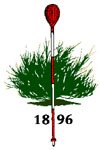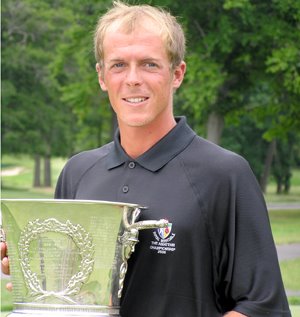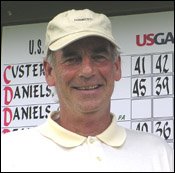And let's go straight to the video ta -- er, ah, excerpts of the transcript of the press conference with USGA president Walter Driver, championship committee chairman Jim Hyler and executive director David Fay:This is Driver talking...The second announcement I want to make is that the
2013 US Open will be conducted at
Merion Golf Club in Ardmore, Pennsylvania. We're really excited about this. It's a great golf course, a great club, wonderful connections with the USGA for years and years. We had the U.S. Amateur there last year, they're going to host the Walker Cup, and now the 2013 U.S. Open.
This, in my experience, is a remarkable example of cooperation among the people at the club, the Haverford Township, Haverford College, all of the local authorities in that area, even the people who live around the golf course are pitching in to make more room available for all the fans who will come out and make sure that we can conduct a wonderful U.S. Open at Merion.
Important stuff here...We think that the
U.S. Open at Merion will be approximately the size of the U.S. Open here at Winged Foot, maybe slightly smaller, but it will be -- a lot of people will get a chance to come to the U.S. Open in Philadelphia and appreciate both Merion and all the elements of a U.S. Open.
I want to thank the people from Merion. We have a big group from Merion here today. Stand up, folks. They're very happy to be here. Thank you very much.
(Applause).
Q. Question about Merion. How many fans are you expecting at Winged Foot? What capacity do you expect at Merion? And at what point were you certain that Merion was capable of hosting a U.S. Open since there has been so much talk about it? WALTER DRIVER: We've sold 35,000 tickets here at Winged Foot. We think we can come close to that at Merion. Maybe not quite, but close to it.
This has been a great process where we have worked with the people at Merion, as I said, Ardmore and Haverford Townships and Haverford College, to deal with issues such as parking, security, access. We'll have more grandstands at Merion than we've had in the past.
There's no single answer. It's all of those things come together in being able to conduct a really top quality U.S. Open at Merion.
Q. Quick follow-up, this came up a couple years ago. I was under the impression that the gallery limit might be about 20,000 and it would be okay to take a hit for one year. Where did you come up with the extra space? WALTER DRIVER: We can do that by a variety of ways. People along Golf House Road have offered to let the club and the U.S. Open use their property. The Haverford College has helped with the parking so that we can park people at Haverford and let people walk across the train tracks where we'll build a bridge. There are a lot of creative solutions to that issue that all the people involved have come up with.
Q. For David, there's been a lot of pros and cons with Merion, the course and the length of it. I'm wondering about your thoughts about what went into the process. I know you've done a lot of studies there and whatever, how do you feel the course will hold up?
DAVID FAY: Well, we put a lot of thought into this, and again, hats off to the leadership of Merion. I think I can use this automobile because it no longer exists, but there was once a commercial "It's not your father's Oldsmobile," in some ways I'd say it's the same for Merion.
They've always had great holes, a number of great layup holes where you weren't using driver off the tee. But they've been able to make their long, stout holes, the ones that have been known throughout history. They've made them really long. So I think they have adapted so well to the changing nature of the game.
There was a question before about the gallery. I think you were there, but if you noticed, a lot of trees have been removed, and that also adds the gallery component. We have not been to Philadelphia since 1981. It is a great course; it's rich in history. We used the Amateur as sort of a testing ground where you had the finest players in the world, the finest amateur players in the world, for whom hitting the ball a long way is not an issue.
So in all respects, and I think, hats off, again, to the leadership of Merion and to our operations people who truly investigated all of the pros and cons of this in a very detailed way, as Walter and Jim have said, we feel very comfortable going back to Merion in 2013.
Q. Regarding Merion, based on your analysis of player performance at the Amateur, are there any specific tweaks or major changes to the golf course itself you anticipate making? WALTER DRIVER: We'll move a putting green to have more room for crowd movement around the clubhouse, and that's the only major change. They'll move the 14th tee in the same general area, but other than that, we contemplate no major changes in the golf course.
 More pearls of wisdom from Mulligan's Laws: A Lifetime of Golfing Wisdom from the Genius Who Invented the Do-Over.
More pearls of wisdom from Mulligan's Laws: A Lifetime of Golfing Wisdom from the Genius Who Invented the Do-Over.















